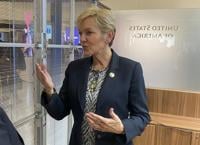Everyone loves a deal, but many ║┌┴¤│ď╣¤═°s either forget or don't realize they can find discounts through their workplace.
ÔÇťThere really are a lot [of perks] that employees just donÔÇÖt seem to know about,ÔÇŁ said Debby Carreau, CEO and founder of Inspired HR, a human resources consultancy with offices across Canada.
ÔÇťThose things do become part of a total compensation package when youÔÇÖre looking holistically at what your total budget is. So if youÔÇÖre living paycheque to paycheque ÔÇö as half of ║┌┴¤│ď╣¤═°s do ÔÇö those things can really be helpful.ÔÇŁ
There are a few reasons why employees might not be fully informed about workplace discountsÔÇö your job offer might not have included a detailed breakdown of all your benefits, large and small. Or your onboarding process was an information overload and youÔÇÖve forgotten, said Carreau.
ItÔÇÖs even possible your onboarding ÔÇťjust wasnÔÇÖt very robust,ÔÇŁ she added.
On the high end of perks, Carreau pointed to extravagant examples from Silicon Valley ÔÇö paid sabbaticals for travelling, on-site health care, free meals and dry-cleaning ÔÇö but more commonplace examples include deep discounts at retailers.
Employees likely expect discounts from their own company and brand, but sometimes brands trade benefits with each other, Carreau said, which boosts staff perks on both sides.
Some employees might have access to savings on gas and groceries, as well as travel deals, such as better rates for car rentalsor hotels. Employers might provide staff with free financial planning services, including direct deposits into savings accounts and financial advice, she added.
People who work in certain sectors can sometimes enjoy standardized discounts ÔÇö just ask at the counter.
ÔÇťWhen youÔÇÖre out shopping, when youÔÇÖre at the cash register, ask if they have corporate discounts,ÔÇŁ Carreau said. ÔÇťA really common one is a lot of teachers, university professors, health-care workers, all kinds of brands offer discounts, you just have to ask for them. And sometimes theyÔÇÖre as high as 20 per cent.ÔÇŁ
According to , some “crazy employee benefits” they’ve seen include tickets to local shows, seasonal passes to a nearby ski resort, two hours of housecleaning services per month, and even pet insurance — all free.
More ordinary add-ons from employers include deals for phone plans and gym memberships, said Jennifer Schmidt, partner and innovation leader for Mercer, a global HR consulting firm. But in some of the larger plans she sees, flexible benefits, which allow for more tailored allocations to different benefit categories, can give more choice back to employees.
ÔÇťIn a flexible program, you can get to choose between your health insurance being at a certain level, or a slightly lower level, or maybe you want everything in a health spending account,ÔÇŁ Schmidt said.
Mercer research showed younger people want more preventive health-care tools, Schmidt said, such as telemedicine, nutritional counselling, or sleep therapy. Some of these services are already available in employee assistance programs.
When advising employer clients of all sizes, the common wisdom is that such services ÔÇťenhance their value propositionÔÇŁ for staff, Schmidt said.
ÔÇťMy comment would be that the definition of a benefits program needs to be more expansive, and it needs to include different types of services and support for all of your employees, not just the ones that fit in the box at the moment,ÔÇŁ Schmidt said.
ÔÇťHow can your benefits program in aggregate ÔÇö including perks, including discounts, including access to care, all of those things ÔÇö work together to really enhance that employeeÔÇÖs experience?ÔÇŁ
And itÔÇÖs not just the biggest companies ÔÇö Mercer also works to bundle plans for small- to medium-sized employers. So employees at smaller firms should still check their benefits for discounts or services that could be free.
Not sure whatÔÇÖs in your plan? Just ask. If your onboarding was long ago and you forget how to find the materials, check with your HR contact, Carreau said. When sheÔÇÖs advising employers on their plans, she stresses the importance of staff using their plans and perks to the max.
ÔÇť[We encourage] the employees to fully utilize everything, because thereÔÇÖs a direct correlation to employee engagement, which leads to employee retention,ÔÇŁ Carreau said.
ÔÇťOld school employers will think, 'Don't tell anyone about our benefits, because our premiums will go up.ÔÇÖ The data supports the exact opposite ÔÇö you want people to use the benefit.ÔÇŁ
This report by ║┌┴¤│ď╣¤═° was first published June 25, 2024.








































